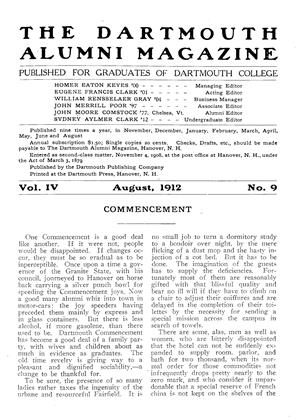The twelfth graduating class of the Tuck School completed its course in April, the group of thirteen men representing the largest second-year class since the founding of the school. As has been experienced for several years, the graduates found more difficulty in choosing than in finding positions, for the number of business opportunities open to them greatly exceeded the number of men available. Three members of the class are with great shoe manu-facturing concerns, two of them in operating departments, the third in statistical work. Two men entered the field of foreign exchange. The others are represented in public accountancy, note brokerage, printing and publishing, advertising, department store merchandising, investment banking, street railway operation, and public utilities management. Their initial salaries ranged from forty dollars to something more than one hundred dollars per month.
In this connection, it is important to note the significant part which a school of business administration may play in assisting young men to choose business vocations best suited to their capabilities; indeed, it seems that in no other profession is there greater need for wise counsel in the choice of particular fields of specialization in business. The Tuck School has undertaken to broaden its usefulness by directing and introducing its graduates to the sort of positions for which they have indicated capability.
Some years ago, a German investigator, after a visit to America, wrote of the Tuck School that its high standards gave promise of attracting students whose chief purpose would be to secure training as commercial teachers. As a matter of fact, only one graduate of the school is engaged in the field of business education. It should be noted, however, that the school frequently receives requests to recommend men for teaching positions in schools of secondary and higher grades, the salaries offered ranging as high as $2,400 per annum. This demand may be an indication that future graduates of the school will be attracted by the rewards offered by teaching careers. ,
Of the first-year class of thirty-eight men more than twenty have expressed their intention to return for the second year course.
.Approximately sixty men have applied for admission to the first-year class. It is liksly that about two-thirds of this number will meet the requirements and be granted admission.
An investigation of the influence of the associated graduate schools upon Dartmouth undergraduates—if such an investigation is ever made—is likely to reveal that in scholarship, at least, the influence is not inconsiderable. The young men who have entered the College with the definite purpose of continuing in the Medical School, as well as those who, in their undergraduate life, are attracted in the same direction by the honorable records of Dartmouth medical men, must be inspired to stronger efforts to master the subjects which lead up to their later professional study. And it can hardly be gainsaid that men who achieve scholarly work in certain .branches of study usually effect a well-rounded record in other branches. Moreover, it has long been an undergraduate tradition that a man aspiring to the substantial C. E. of the Thayer School must "work his head off" for five years.
In like manner, now that the idea of a graduate training for business is being taken by undergraduates with some of the seriousness which business men of vision have long accorded it, there is evidence that the Tuck School has assumed a part in the encouragement of serious undergraduate study.
In another direction, the school has aimed to broaden the influence of the College; and with such a purpose welcomed some four hundred guests to a conference on scientific management, held in Hanover on October 12, 13, and 14. The visitors, representative of a wide range of business, governmental, and educational activities, heard and participated in the addresses and discussions devoted to the new science of management. At the same time, the guests observed the College and its life; and they warmly expressed their admiration for both. The published report of the conference* .is being sought from all parts of the country. It is believed that here, also, the school has found a way by which the worth of Dartmouth College is strengthened in fact and in name.
It has been borne in upon the staff of the school that the type of higher business education that was deemed efficient a decade ago, is now obsolete. What was then considered of great utility consisted largely of instruction in the more obvious facts and methods of business operation. The greater principles were slow of definition. But the point of view has changed marvelously, and whereas "system" at that time was popularly considered the capstone of skillful management, system is now taken for granted as a mere part of the managerial mechanism. The spirit of scientific research, applied to all phases of business operation and governed by a new and insistent philosophy of mutual responsibility and cooperation, imposes a heavy duty upon educators in business management. The Tuck School is striving to keep abreast of the progress.
*Addresses and Discussions—Scientific Management, 378 pages, $2.50; by mail, $2.75.
 View Full Issue
View Full Issue
More From This Issue
-
 Article
ArticleTHE STATE OF DARTMOUTH COLLEGE
August 1912 -
 Article
ArticleCOMMENCEMENT
August 1912 -
 Article
ArticleDARTMOUTH ATHLETICS
August 1912 By C. E. Bolser -
 Article
ArticleTHAYER SCHOOL OF CIVIL ENGINEERING
August 1912 By Charles A. Holden -
 Class Notes
Class NotesCLASS OF 1897
August 1912 By Merrill Boyd, HARRY H. BLUNT -
 Class Notes
Class NotesCLASS OF 1897
August 1912 By Merrill Boyd, HARRY H. BLUNT








